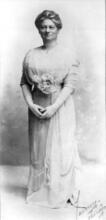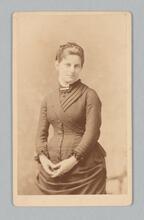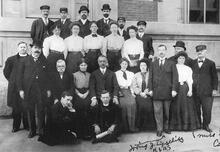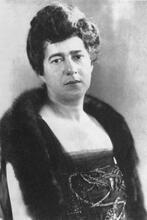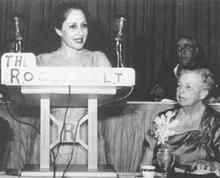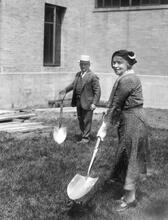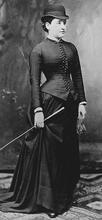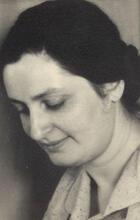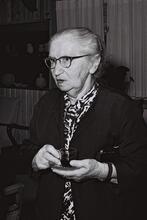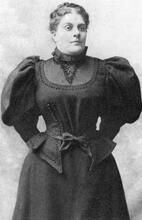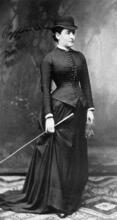Anna Marks Allen
Anna Marks Allen was part of a group of Philadelphia Jewish women who established and ran the first independent Jewish charitable societies in the United States. At a time when congregational Jewish life was restricted to men, Jewish women of Allen’s social status increasingly turned towards philanthropy as a way to participate in the public life of the Jewish community. Among her leadership positions, Allen co-founded the first Hebrew school in the United States in 1838, established and served as president of the Philadelphia Jewish Foster Home and Orphan Asylum, and served as treasurer of the Female Hebrew Benevolent Society for forty years. These institutions set a precedent for other Jewish communities throughout the United States.
Article
“May you live to be a credit to yourself, a comfort and blessing to your parents, and the pride and protector of your sisters,” wrote the educator and social activist Anna Allen to her nephew Lewis. In many ways, these words encapsulate her own life, which she devoted to the protection and betterment of the lives of Jewish women and children.
Allen was one of a group of Philadelphia Jewish women who established and ran the first independent Jewish charitable societies in the United States. She was treasurer of the Female Hebrew Benevolent Society (founded 1819) for forty years and, for a time, its director as well. In 1838, along with Rebecca Gratz, she founded the first Hebrew Sunday school in America, and in 1855, she started the Philadelphia Jewish Foster Home and Orphan Asylum, serving as its president until 1867. These institutions were later duplicated by Jewish women throughout America.
Anna was born in Sing Sing (now Ossining), New York, on March 30, 1800. Her father, Michael Marks (1761–1829), came to America from London in 1772. He married Jochebed (Johavith) Isaacks (1767–1852), also from England, in Newport, Rhode Island, in 1786. Anna was the sixth of nine children and the third daughter born to the couple. On December 10, 1823, she married Lewis Allen, Jr. (1793–1841), a Philadelphia merchant. He had come to the United States from London with his father in 1805. They had seven children: Amelia Johaveth (b. 1824), Lewis Marks (b. 1827), Henry Samson (b. 1828), Michael Mitchell (b. 1830), Benjamin Wolff (b. 1833), Charles Chauncy (b. 1835), and Alfred Hart (birthdate unknown).
The Allen family was prominent in early Philadelphia Jewish life. Anna Allen’s father-in-law was president of Congregation Mikveh Israel from 1811 until his death in 1815, and her husband served as president of the congregation from 1834 until his own death in 1841. Though the offices of congregational life were restricted to men at that time, women of Allen’s social position developed new ways to participate in the public life of the Jewish community. In particular, they tried to address the educational and spiritual needs of less fortunate Jewish women and children, whose numbers rose throughout the nineteenth century due to increased immigration from Europe. The growth of Jewish women’s charitable societies closely mirrored developments among American Christian women, who, like their Jewish counterparts, seized upon newly emerging patterns of religious organization in America to establish a niche for themselves within the public sphere.
In 1875, Allen left Philadelphia for New York City, where she lived until her death on June 30, 1888. Anna Marks Allen’s life work is a testament to her devotion to the Jewish community, and an important chapter in the history of women’s contributions to the development of American Jewish life.
Allen, Anna. Letter to Lewis Allen. Philadelphia, June 28, 1858.
Ashton, Dianne. “‘Souls Have No Sex’: Philadelphia Jewish Women and the Challenge of America.” In When Philadelphia Was the Capital of Jewish America, edited by Murray Friedman. Philadelphia: Balch Institute Press, 1993.
Marcus, Jacob R. The American Jewish Woman: A Documentary History. New York: Ktav Pub. House, 1981.
Markens, Isaac. The Hebrews in America. New York: Published by the author, 1888.
Morais, Henry Samuel. The Jews of Philadelphia: Their History from the Earliest Settlements to the Present Time; a Record of Events and Institutions, and of Leading Members of the Jewish Community in Every Sphere of Activity. Philadelphia: Levytype Co., 1894.
Stern, Malcolm H. First American Jewish Families: 600 Genealogies, 1654-1988. Baltimore: Ottenheimer Publishers, 1991.
UJE.
Wolf, Edwin, and Maxwell Whiteman. The History of the Jews of Philadelphia from Colonial Times to the Age of Jackson. N.p.: Jewish Publication Society of America, 1957.

